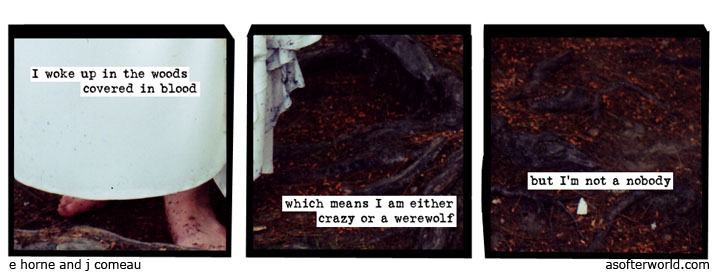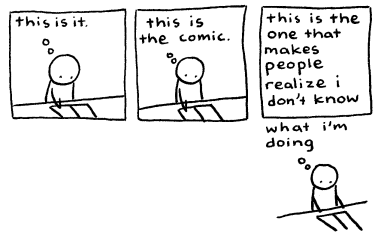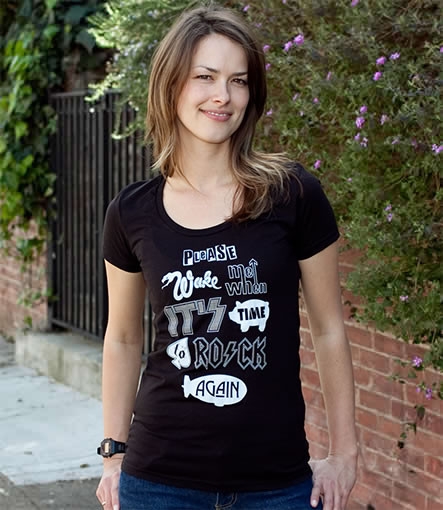It was, after all, a stupid accident. We’d been playing racquetball in P.E., my sophomore year of high school at Mountain View, and I’d gotten myself hit in the eye with the ball. Who hasn’t had that happen to them? I think racquetball is the only sport where one can be looking straight at the ball and it simultaneously hits them in the back of the head.
I was wearing my contacts that day – gas permeable, a.k.a. hard, contacts, since they were cheaper than the soft ones – and my contact had slipped and cut my eye with the force of the racquetball, it hemorrhaged under the conjunctiva. Mom checked me out of school and we went to see the ophthalmologist, who said I’d be fine, the hemorrhaging didn’t look bad at all, and it would clear up on its own in a few days.
That was how it started.
Fast-forward two years. Senior year of high school. Band Tour.
We were going to San Francisco. Originally, I hadn’t planned on attending. School trips were always expensive because we never earned enough at fund raisers. I couldn’t afford to go because I didn’t have a job. (Or, rather, school was my job, my parents insisted.) I felt bad hitting my parents up for five hundred-something dollars, and told Mr. Bowman, the band director, that I wasn’t going.
It turns out, however, that Mr. Bowman did the begging for me. He’d served his mission in Taiwan, the same as my parents and knew both of them. They needed more students to go, or there wouldn’t be enough to cover the trip. My brother Jonathan, two years younger than me and a sophomore, was also in band. Mom and Dad agreed to pay for both of us to go. I was thrilled.
We bussed all over San Francisco, from Fisherman’s Wharf, to Alcatraz (okay, we ferried to Alcatraz), to the Golden Gate Bridge, from the Winchester Mansion to Ghirardelli Square. It was exciting and busy and I learned that I actually could spend more than the hour of class with those people and still stay sane. (Band class was not a favorite.)
Our third day by the bay, we were slated to spend at the Great America theme park. And spend it we did. My friends and I rode every rollercoaster they had, most of them more than once. The last one we went on, Stealth, was terrifying and exhilarating.
Stealth was actually the world’s first “flying” roller coaster. Riders board the coaster standing up as they’re harnessed in – straps across shoulders, chest, legs, almost like a skydiving harness – the coaster then starts to move up the giant hill. Suddenly, you’re on your back, looking up at the sky, thinking “this is dumb, I can’t see anything.” It climbs higher. You think surely you’re going to drop any second, but it doesn’t, it goes even higher. It stops, and instead of dropping, it turns. Turns and drops. And you and the rest of the passengers are hanging in your straps, headed toward the ground like so many Supermen. If you can reclaim your mind from the paralyzing terror of having nothing solid between you and the ground, you throw your arms out in front of you and stick with the Superman idea, going around loops, corkscrews, and drops. It stops and you’re standing again, lucky that there’s like a built-in seat and you’re still harnessed, because your knees are weak and you’re trying to process what just happened. You blink.
I blinked.
Something was wrong with my contact. My eyes were too dry – or were they too watery? I blinked again, thinking my contact was suctioned onto my eye, which happened on occasion. We got off the coaster and I hurried to the nearest restroom, desperate to take my contact out and rinse it off and put it back in right. Stupid amusement parks and their gross bathrooms with impossibly long lines. It was fifteen minutes before I got to a sink, barely registering my gratitude for drains that wouldn’t lose my contact in case it slipped in the stream of water. I popped my contact out – it wasn’t suctioned on after all – and blinked while I rinsed it off. Augh! I had taken out the wrong one, the weird look was still there. I put it back in and took the other one out. Nope. Maybe it was the first eye. Maybe I’d just been wearing my contacts too long and my eyes were protesting. Maybe I hadn’t gotten enough sleep last night and my eyes were just tired – not an absurd hypothesis, when one’s spending the night with 5 other girls in the same hotel room.
It’s hard to describe the difference in my sight. I’m an artist. I’ve always been someone who observes things. Pebbles in asphalt. The veins on the undersides of leaves. The difference between crimson and vermillion and just plain red. It was like my sight was suddenly a camera lens. Hyper-focused, or not focused enough. The edges of things were different. The lines, contours of things, weren’t lined and contoured right. I was annoyed.
My friend Seth and I realized that we were going to be late for the awards ceremony they were having in one of the pavilions. We rushed to meet the other band members and have dinner. It was a boring affair, silly plaques for every band who participated in the festival so we’d have something to mark the occasion. To commemorate hours of practice on songs we wouldn’t remember a year from now that we didn’t really play all that well either.
I wanted to get back to the hotel. I wanted to take my contacts out and put on my glasses. I wanted to go to sleep and see if things would line up right in the morning. I maintained a futile blinking vigil until we got off the bus at the Residence Inn; by then, I was irritated and genuinely tired. I’d been quiet and distant the whole evening and my friends noticed something was wrong, but were too caught up in the excitement of the day and of the tour in general for it to register, and they left me alone.
Up in our room, after Jenny and Cammi had finished using the bathroom, I took my contacts out and washed my face. I blinked at the mirror. It still wasn’t right. I covered my left eye. I stared down my reflection; she looked back at me concerned, holding her hand up to her face. She slid her hand to the other eye, the shadow of her arm crossing over the Alcatraz Penitentiary Swim Team t-shirt she was wearing for pajamas. I looked at the lettering on her shirt, the edges of the letters there and yet, not there. The contour of her arm, there and not there. Her hand fell and she glanced at me, a mixture of fear and uncertainty in her hazel eyes that, also, were there and not there. Lined and contoured in an out-of-focus sort of focus. I pitied her. I was her.
I put my glasses on, knowing against a now-crippled wish that they’d do no good. Sleep was the only recourse I had left to find an answer in, here on the edges of things. I fell to the mattress on the floor and woke up early the next morning, forgetting for a moment that anything was wrong, until I’d gone into the bathroom and noticed my contact case on the counter. I put it away in my bag.
We had another performance that day. Somewhere a bit up the coast from the main hubbub of the city, in the hills. It was green; I can’t remember the name of the place. It was like a concert hall in the middle of some botanical gardens. It had rained and everything was wet. Glistening. The added glare off the raindrops, instead of filling me with that familiar ache of something beautiful, annoyed me because they made were blurring the lines of things even more.
As we clamored out of the buses to go assemble our instruments, stretch our legs, and wander around the gardens until it was our turn to play, I heard familiar voices and turned to look. My parents were there, with my brother Joseph (the baby at the time) in the stroller.
Mom and Dad had decided to surprise us and fly out with the baby to come hear us play and to have their own mini-vacation, leaving our two sisters with the neighbors. In the excitement of having them suddenly there, I was distracted from the annoyance of my sight. My friends and I hauled the baby around, joked with Dad.
The problem with my eye settled to the background until we were sitting under the bright lights of the stage. My bass clarinet was glinting, the flutes in front of us twinkling silver and fast, the saxophones to the left glared gold just as the trumpets on the right did. I was anxious and discontent. I kept shifting in my seat, turning to avoid the glare. I pulled out our sheets of music and groaned inwardly. The black and white of the lines and the dots on the page – so many lines – made whatever was wrong with my eye start screaming. I couldn’t look at the lines.
Mr. Bowman raised the baton and I tried to play, but I couldn’t, I couldn’t look at the music. I fingered blindly, not playing a note. Which didn’t really matter, anyway. I was only a bass clarinet, a last-minute position I had been pushed to. The unsung limbo of the band world. Every symphonic band is supposed to have one, and yet no one ever notices them. Even when they play, because they mostly just follow the tuba or baritone sax parts. Steve, my cohort in said limbo, looked askance at me, raising an eyebrow in question. I shook my head slightly and turned the page for him. I closed my eyes.
The next day, Mom and Dad took me and Jenny to go tour the Winchester mansion and I told them about my eye. Mom was worried and Dad said they’d schedule me an eye appointment when they got home so that I could go see Dr. Donaldson (the ophthalmologist from my racquetball injury) as soon as the band got back to good ol’ Utah Valley.
As we finished the last two days of concerts, I noticed my eyes getting worse. Instead of the lines of things being out of focus and not out of focus, I now noticed in the center of my field of vision in my left eye a round area of distortion. The best way I have been able to describe it is with comparisons to that old Windows screen saver, where the 3D ball or lens bounces around your screen, twisting and distorting the image on the screen as it goes. However, in my eye, the ball was stationary. And right smack in the middle.
I tried to have fun with my friends, to ignore what was happening to my eye and just have a good time. There was nothing I could do to fix it without the doctor, so I might as well enjoy myself. That’s what I kept telling myself, anyway. Inside, I was distraught. I was ignoring things as a way to cope with them. If I didn’t think about it, it wasn’t really happening. God knew me. God knew that my art, my perception of things, was a pivotal center of my existence. He knew that I’d always said I’d rather be deaf than have anything happen to my eyes.
Upon arrival in Utah, and after a visit to Dr. Donaldson, we learned that things were not well with my left eye. Apparently the racquetball injury had done far more damage than originally suspected – not only had my conjunctiva been damaged, but the impact of the ball had somehow caused a scar on my retina. And, as luck would insist on having it, the blood vessels in the scar had hemorrhaged on that exhilarating roller coaster ride and detached my retina from the back of my eye. Dr. Donaldson decided to pass me on to a retinologist.
Dr. John Carver is one of the best retinologists in Utah. Lucky for me, his office was only a ten-minute drive from our house.
I would spend a lot of the next four months in Dr. Carver’s office as we learned that I had a fun condition called cardio neo-vascularization – meaning my body randomly generates new blood vessels, especially around scarred areas, which is why the blood vessels in my eye had ruptured at the scar.
He watched carefully as I sat with his assistant and had my first fluoroscene angiogram, which consists of being injected with the medical equivalent of highlighter ink to make your blood vessels easier to see and then having them hold your eye open while they shoot bright pictures of the inside of it. No one told me that I'd also be peeing highlighter ink for the next two days. I made my family come check it out before I flushed. Only the first time. I had seven more. Even that novelty wore off.
John Carver was the first and only person to inject a needle not only in my eye socket (twice), but into my eyeball as well. A procedure I was completely awake and cognizant for. It’s not as bad as people make it out to be as kids. I can think of worse things to stick at the end of “cross my heart, hope to die” chants, now that I’ve had the needle in my eye. A sensation akin to squishing a particularly large-abdomened spider in a Kleenex – that slight resistance and then easy pop…
Dr. Carver was the one who burned the hole in the back of my eye to cauterize the blood vessels and stop them from hemorrhaging and detaching more of the retina, when after a month we couldn’t get them to stop. I had cortisone injections behind my eye, which hurt like Hades for a week as I got to march around school with an eye patch and feel like my eye was being pushed out of my head from the inside from all the extra pressure.
Three months into a then-regular cycle of visit – diagnose – treat – wait – visit – diagnose new problems – treat – wait, we were at our wits’ end as to what was causing the new hemorrhaging every few weeks and I made some off-hand comment about how nice it was being excused from P.E. and it’d be great to be excused from the rest of my classes, especially band. It was Dr. Carver who looked at me and asked what instrument I played. Dr. Carver who discovered that it was blowing my clarinet that was causing the pressure than kept re-rupturing the blood vessels; that had exacerbated the original hemorrhaging from that first night on the roller coaster. Dr. Carver who told me that if I’d stopped playing that stupid limbo-of-the-band-world instrument after I’d gotten off the roller coaster, I wouldn’t have the huge blind spot in the middle of my eye that I have now.
That was when I got angry. That was when I started to blame God. I had been living right. I had been living better than I had any of my other troubled teenage years, saying my prayers, reading my scriptures, participating in seminary, helping with the family, serving as a stake youth counselor. I had done everything I was asked, was finally living in faith, strong in the gospel, and God had made me – me the artist, the girl who walked staring at the sky, who picked up rocks on the road to look at them closer – blind.
My faith wavered. Sometimes it still wavers.
I still have the blind spot in my left eye. I can read out of my left eye now, with my peripheral vision, if the font is large enough. I still have the same prescription for my left eye in my glasses that I had when I was 17 because every time we’ve tried to update it, the test isn’t ever right. I still have a strange sense of lost focus. Of lines and the shapes of things being right and not-right. Of my right eye compensating for the hole in my left.
I still wonder why it had to happen; still wonder what I was supposed to learn from it all.
I read about Monet, who had cataracts, of Degas who was partially blind in one eye, and I hope. I read up on the latest technology for people with macular degeneration, which is the closest medical problem in relation to my own condition.
I keep going. I still have the rest of my sight.
I still appreciate the tiny things, perhaps even more now. The undersides of leaves. The Douglas firs on the side of Y Mountain that you can see from the freeway. The way the edges of pebbles in asphalt glint in the light, especially after it rains.



















 You're killing me. I've got the aforementioned 3 kids and the Toyota Sienna... or the "losermobile" as my teenager calls it.
You're killing me. I've got the aforementioned 3 kids and the Toyota Sienna... or the "losermobile" as my teenager calls it.

 WHAT THE HELL ARE YOU DOING HERE?
WHAT THE HELL ARE YOU DOING HERE?